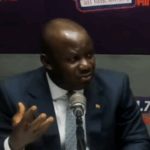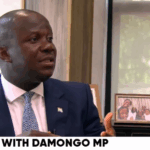
A request for accountability over Ghana’s agreement to accept deportees from the United States sparked a tense exchange in Parliament, with the Majority Leader, Mahama Ayariga, promising future engagement but avoiding an immediate floor debate.
The Minority is demanding to know if the diplomatic concession—the reversal of restrictive US visa sanctions—was tied to the controversial deportation deal.
The central issue surrounds the nature of the understanding reached between Accra and Washington that led to the US repatriating not only Ghanaian citizens but also third-country West African nationals via Ghana.
The debate was ignited by the Second Minority Whip, Habib Iddrisu, who formally requested the Majority Leader to schedule the Minister of Foreign Affairs, Samuel Okudzeto Ablakwa, to brief the House.
The request follows the US Embassy in Accra’s decision to reverse a sanction that had dramatically scaled back visa privileges for Ghanaian applicants.
The previous sanction had slashed the standard five-year multiple-entry visa down to a stringent three-month single-entry visa, posing significant travel and business hurdles. The reversal restores the more favourable conditions.
Mr. Iddrisu directly challenged the official narrative of the visa reversal:
“We need to know the reasons associated with the reversal. Is it tied to Ghana accepting the deportees into the country?”
The Minority Whip also drew a historical parallel to the 2016 transfer of the two former Guantanamo Bay detainees (the “Gitmo Two”), noting that that case had required a Supreme Court ruling to settle constitutional questions regarding the executive branch’s power to bring foreign nationals into the country without parliamentary assent.
In his robust counter-argument, Majority Leader Mahama Ayariga defended the government’s diplomatic success while downplaying the legal necessity of a special agreement for receiving West African nationals.
Mr. Ayariga emphasized the significant relief the visa reversal offers to the nation’s economy and its citizens:
“The Leader of Government Business said it was a good thing that the American government had reversed its visa sanctions on Ghana and the Foreign Affairs Minister should be commended to achieve the visa reversal.”
He stressed the negative impact of the sanctions on global commerce, noting that the restrictions were going to “very inconveniencing to them [Ghanaians with family in the US]” and would “cripple a lot of those businesses” engaged in the multi-billion-dollar trade relationship between Ghana and the US.
“And so for the minister to have successfully within a very short period of time when the US announced the sanctions gotten the US to reverse the sanctions is something that we should be happy and proud of and commend the minister very highly,” he said.
On the core issue of accepting third-country deportees, Mr. Ayariga anchored the government’s position in the ECOWAS Protocol on Free Movement of Persons (1979). This foundational regional treaty grants community citizens the right to enter and remain in any member state for up to 90 days without a visa.
“I clearly knew that every citizen of ECOWAS had the right to sit in an aircraft, disembark in Ghana and continue to their countries after 90 days with or without an agreement with the US government.”
“The ECOWAS protocol entitles every citizen to decide that they want to be sent to Ghana and when they come to Ghana, they have a right to remain in Ghana for at least 90 days.”
“And so any agreement that we will receive you when you arrive in Ghana is a natural consequence of the right of that ECOWAS citizen to decide that they want to disembark in Ghana from the US,” he concluded.
Despite the firm defence, Mr. Ayariga assured the House he would personally “engage with the Minister of Foreign Affairs” to ensure a briefing occurs.
However, he also advised the Second Minority Whip—a “senior member of the House”—to use the established legislative process by filing an urgent question to compel the minister’s appearance.
The ball is now in the Minority’s court to use its parliamentary tools to force the long-awaited public clarity on the diplomatic arrangement.



